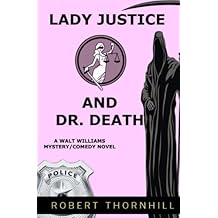
This interesting book is not quite an even-handed look at euthanasia. The cards are stacked in favor of "death with dignity."
First, let me give author Thornhill his due: the characters are complex and worth knowing, the plot proceeds logically and satisfyingly, the ending makes sense. He writes well, albeit with thumb and one finger. The other reviewers have given him 5 stars, "love it."
I like my heroes a bit more attractive than a randy sixty-five-year-old, even though I myself am in my seventies, or perhaps because I am in my seventies. Still, Walt Williams is a fine man, a thoughtful man, and he and his partner, Ox, work well together, with Ox supplying the needed muscle.
So, euthanasia: we have enough morphine to kill pain, and I am not opposed to using it even to the extent it risks the patient's life, instructions I gave her doctors 13 years ago when my wife, newly quadriplegic and placed on a ventilator permanently, was fighting for her life after a near-fatal aspiration due to her multiple sclerosis. When she emerged from her therapeutic coma, she was glad I had reversed her instructions that precluded heroic efforts to save her life.
Before the crisis, you think you know what you want, but you cannot really know. During the life-threatening crisis, you are distracted or incompetent to to make a rational, informed decision, and only afterwards do you have a knowledge of what happened and what resulted, and how you feel about what was done.
If you are going to sign a Living Will, an Advanced Directive about how much effort should be expended on saving your life, be very cautious: you do not know what your future will be. Patients with DNR (Do Not Resuscitate) instructions are given less good care, my wife's nurses tell us, despite the denials of medical institutions.
Patients who are capable of committing suicide and want to, should be allowed to do so, though discouraged from carrying it out. It is hard to see morality in not taking your own life, as there are many relatively painless ways to do it, but asking someone else to kill you.
For the near-total disability of ALS, for example, the issue is progressive loss of capability, and the "answer" is to help such patients with technology to gain something of worth in living each day, "the plan is to enjoy what you can." Sadly, the patient will reach a stage where nothing can be enjoyed and he is unable to take his own life. Not every ethical has a solution. The patient should be given our compassion and admiration for fighting the good fight to the end.
I will likely read another of the Lady Justice series, despite my reservations about this novel.
No comments:
Post a Comment